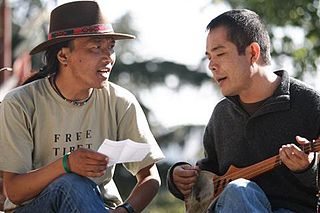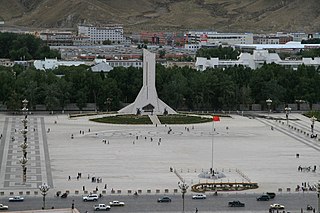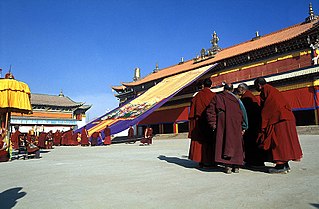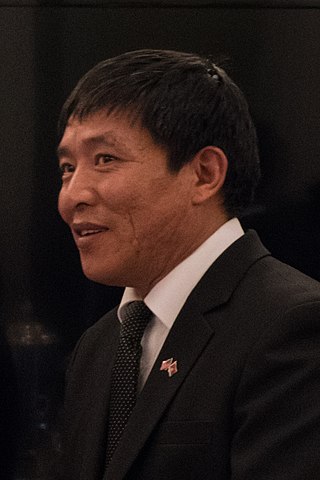This article's factual accuracy is disputed .(April 2010) |
Tashi Dondrup is Chinese singer and mandolin. The 30-year-old musician is particularly popular in his native Tibet. He is the son of Tibetan farmers and was married in 2009. [1]
This article's factual accuracy is disputed .(April 2010) |
Tashi Dondrup is Chinese singer and mandolin. The 30-year-old musician is particularly popular in his native Tibet. He is the son of Tibetan farmers and was married in 2009. [1]
Dondrup released a CD called "Torture Without Trace," in December 2009. It contains thirteen songs telling of nostalgia for the exiled 14th Dalai Lama, and remembering the crackdown that followed the 2008 Lhasa violence. The 5,000 CDs produced were sold out quickly among Tibetans in the Amdo region of eastern Tibet, where he is a local star. Authorities immediately banned the CD. [1] He was detained by government authorities in December 2009, in Xining, the capital of Qinghai province, where he had gone into hiding. He had a record of arrest from 2008 to March 2009 from a previous CD. [2] [3]

The Panchen Lama is a tulku of the Gelug school of Tibetan Buddhism. The Panchen Lama is one of the most important figures in the Gelug tradition, with its spiritual authority second only to the Dalai Lama. Along with the council of high lamas, he is in charge of seeking out the next Dalai Lama. Panchen is a portmanteau of Pandita and Chenpo, meaning "great scholar".

Lobsang Trinley Lhündrub Chökyi Gyaltsen was the tenth Panchen Lama, officially the 10th Panchen Erdeni, of the Gelug school of Tibetan Buddhism. According to Tibetan Buddhism, Panchen Lamas are living emanations of the buddha Amitabha. He was often referred to simply as Choekyi Gyaltsen.

Drepung Monastery, located at the foot of Mount Gephel, is one of the "great three" Gelug university gompas (monasteries) of Tibet. The other two are Ganden Monastery and Sera Monastery.

The 11th Panchen Lama controversy centers on the 28 year-long enforced disappearance of Gedhun Choekyi Nyima and on the recognition of the 11th Kunsik Panchen Lama. The Panchen Lama is considered the second most important spiritual leader in Tibetan Buddhism after the Dalai Lama. Following the death of the 10th Panchen Lama, the 14th Dalai Lama recognized Gedhun Choekyi Nyima in 1995. Three days later, the People's Republic of China (PRC) abducted the Panchen Lama and his family. Months later, the PRC chose Gyaincain Norbu as its proxy Panchen Lama. During the traditional search process led by Chadrel Rinpoche, he indicated to the Dalai Lama that all signs pointed to Gedhun Choekyi Nyima, while the Dalai Lamas and Panchen Lamas recognize each other's incarnations. The PRC had established its own search committee, which included Chatral Rinpoche and other monks, and wanted to use a lottery system referred to as the Golden Urn. Neither Gedhun Choekyi Nyima nor his family have been seen since the abduction. Chatral Rinpoche was also arrested by Chinese authorities the day of the abduction.

Ngawang Choephel is a documentary filmmaker, director, producer, and musician.

Namling County is a county of Shigatse in the Tibet Autonomous Region, China.

Namgyal Lhamo is an internationally acclaimed Tibetan Opera, classical singer and actor. She is based in Utrecht, The Netherlands.

Tenzin Tsundue is a poet, writer and Tibetan refugee and activist. As of 2019 he has been taken into preventive custody, arrested or jailed 16 times for short durations for his activism by Indian authorities, as India does not allow Tibetans to engage in anti-China activities in India. When he was 22, he travelled to Tibet. However, he was arrested and sent back to India, "They told me I was born in India and so I did not belong to Tibet."

The 2008 Tibetan unrest, also referred to as the 2008 Tibetan uprising in Tibetan media, was a series of protests and demonstrations over the Chinese government's treatment and persecution of Tibetans. Protests in Lhasa, the capital of Tibet, by monks and nuns on 10 March have been viewed as the start of the demonstrations. Numerous protests and demonstrations were held to commemorate the 49th anniversary of the 1959 Tibetan Uprising Day, when the 14th Dalai Lama escaped from Tibet. The protests and demonstrations spread spontaneously to a number of monasteries and throughout the Tibetan plateau, including into counties located outside the designated Tibet Autonomous Region. The arrest of monks at Labrang Monastery increased the tension of the situation. Clashes occurred between Tibetans and Chinese Han and Hui residents, resulting in Han and Hui stores and buildings being destroyed and numerous Chinese civilians being injured or killed.

The sinicization of Tibet includes the programs and laws of the Chinese government and the Chinese Communist Party (CCP) to force cultural assimilation in Tibetan areas of China, including the Tibet Autonomous Region and the surrounding Tibetan-designated autonomous areas. The efforts are undertaken by China in order to remake Tibetan culture into mainstream Chinese culture.

Tashi delek is a Tibetan expression used to greet, congratulate or wish someone good luck. It is also used in Bhutan and Northeast India in the same way. "Tashi delek" is associated with Losar, the Tibetan festival celebrating the lunisolar new year.

Lobsang Sangay is a Tibetan-American politician in exile who was Kalon Tripa of the Tibetan Administration in India from 2011 to 2012, and Sikyong of the Central Tibetan Administration in India from 2012 to 2021.

Lodi Gyaltsen Gyari Rinpoche, Kasur Lodi Gyari or "as he is universally known to the Tibetan-speaking world, Gyari Rinpoche" was a Tibetan politician, and journalist who served as the 14th Dalai Lama's special envoy to the United States. Exiled to India in 1959, he was also the executive chairman of the International Campaign for Tibet.

Human rights in Tibet are a contentious issue. Reported abuses of human rights in Tibet include restricted freedom of religion, belief, and association; arbitrary arrest; maltreatment in custody, including torture; and forced abortion and sterilization. The status of religion, mainly as it relates to figures who are both religious and political, such as the exile of the 14th Dalai Lama, is a regular object of criticism. Additionally, freedom of the press in China is absent, with Tibet's media tightly controlled by the Chinese leadership, making it difficult to accurately determine the scope of human rights abuses.
Ngawang Tashi Drakpa was a king of Tibet who ruled in 1499–1554 and 1556/57–1564. He belonged to the Phagmodrupa Dynasty which was the dominating regime in Tibet from 1354 to 1435 and maintained a degree of authority until the early 17th century. His rule is sometimes considered to be the last of importance in the history of the dynasty.
Dorje Tashi is an entrepreneur in the Tibet Autonomous Region of the People's Republic of China, formerly the head of the Tibet Shenhu Group (西藏神湖集团), a real estate company which developed hotels and apartment buildings in Lhasa. In June 2010, a Chinese court sentenced him to life in prison.

Kirti Gompa, is a Tibetan Buddhist monastery founded in 1472 and located in Ngawa, Sichuan province, in China, but traditionally part of Amdo region. Numerous other associated Kirti monasteries and nunneries are located nearby. As of March 2011, the Kirti Gompa was said to house 2,500 monks. Between 2008 and 2011, mass arrests and patriotic re-education programs by Chinese authorities have targeted the monks, reducing the population substantially to 600 monks. The wave of Tibetan self-immolations began at Kirti Gompa.

Protests and uprisings in Tibet against the government of the People's Republic of China have occurred since 1950, and include the 1959 uprising, the 2008 uprising, and the subsequent self-immolation protests.

Dhondup Wangchen is a Tibetan filmmaker imprisoned by the Chinese government in 2008 on charges related to his documentary Leaving Fear Behind. Made with senior Tibetan monk Jigme Gyatso, the documentary consists of interviews with ordinary Tibetan people discussing the 14th Dalai Lama, the Chinese government, the 2008 Beijing Olympics, and Han Chinese migrants to the region. After smuggling the tapes of the interviews out of Tibet, however, Dhondup Wangchen and Jigme Gyatso were detained during the 2008 Tibetan unrest.

Antireligious campaigns in China are a series of policies and practices taken as part of the Chinese Communist Party's official promotion of state atheism, coupled with its persecution of people with spiritual or religious beliefs, in the People's Republic of China. Antireligious campaigns were launched in 1949, after the Chinese Communist Revolution, and they continue to be waged against Buddhists, Christians, Muslims, and members of other religious communities in the 21st century.
{{cite web}}: CS1 maint: archived copy as title (link) Save Tibet, prisoner list, March 8, 2009